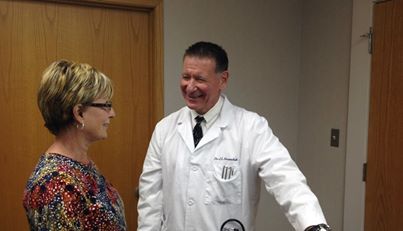
Subcutaneous
Hormone Implants:
Relief
for Persistant Menopausal Symptoms and Sexual Dysfunction
HRT
Therapy
Part 1: Hormone Replacement Therapy,
Panacia or Poison?
Part 2: Hormone Replacemnet Therapy
Is a Personal Choice
Part 3: What Is Optimum Hormone Replacement?
How
To Find A HRT Program That Works For You...
Part 1: Finding An Ideal Regimen
Part 2: Unpleasant Side Effects
Part 3: Progesterone, Progestins
& Progesterone Cream
Sex:
Sex and Menopause
Menopause:
Menopause Overview
Hysterectomy:
Hysterectomy Overview
Ovarian Failure Following Hysterectomy
I Want To Know If I Should I Keep My Ovaries
HRT
& Hormones:
About HRT
Ask
Dr N:
Questions & Answers
Finding
a HRT Program that is right for you
PART 1 - FINDING AN IDEAL REGIMEN
The rationale for women to use HRT following menopause is to sustain quality of life and to be afforded protection from the negative health consequences of hormone deficiency. Accordingly, an ideal HRT regimen would prevent menopausal symptoms, maintain libido, preserve sexual response, maintain the integrity of hormonally dependent tissues and prevent cardiovascular disease, osteoporosis and dementia. Finally, it would accomplish these goals without causing unpleasant symptoms.
These goals can almost always be accomplished if, (1) the hormones used are identical to those secreted by the ovary and are (2) delivered into the bloodstream with their chemical structure intact in (3) amounts sufficient to exert their intended affect that (4) remain at relatively stable blood levels.
Menopausal women who have a negative experience with their initial HRT prescription often become disillusioned and assume that all HRT programs will affect them in the same way. The problem is further compounded if the menopausal woman’s doctor has limited skills in the care of menopausal women. The physician may not be aware that other treatment options are available that are capable of relieving the menopausal woman’s symptoms without causing unpleasant side effects. If a patient fails to respond to the prescribed therapy, the physician may regard them as uncooperative and/or as having a mental problem. After all, they did provide the treatment the "book" said was going to work and if didn’t it couldn’t be their fault. It would have to be a failure on the patients’ part.
How does a woman find an HRT program that relieves her symptoms and doesn’t cause side effects?
She can accomplish this by learning about HRT options and routes of administration. This will enable her to knowledgeably participate in the decision making process. She will be able to either lead her doctor in the appropriate direction, or be able to recognize a physician who has the skills required. Many women are under the impression that all gynecologists and endocrinologists are knowledgeable about menopause. However, menopausal medicine and expertise in HRT is a subspecialty and will be recognized as such in the near future.
Where does she learn this?
She can start by reading the rest of this section and the other sections of the web site, especially those under the HRT & Hormones heading. When she finishes, she may be more knowledgeable about HRT than many physicians.
PART 2 - UNPLEASANT SIDE EFFECTS OF HRT… Why they occur and strategies to avoid them.
PART 3 -PROGESTERONE, PROGESTINS & PROGESTERONE CREAM...What exactly are progesterone and progestins?
Appointments
with Dr. Nosanchuk can be made by contacting Caroline
(248) 644-7200 from 10:00am to 6:00pm Monday - Friday (EST).
This web site is for educational purposes only. It is not intended to suggest a specific therapy for any individual and must not be construed to establish a physician/patient relationship.
